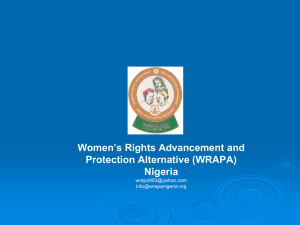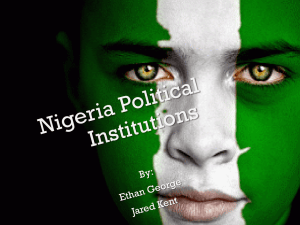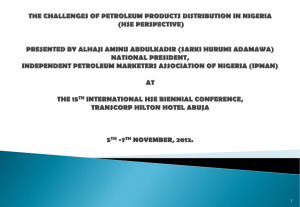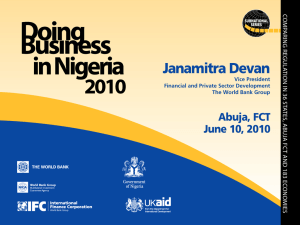REVENUE DERIVATION UNDER THE 1999
advertisement
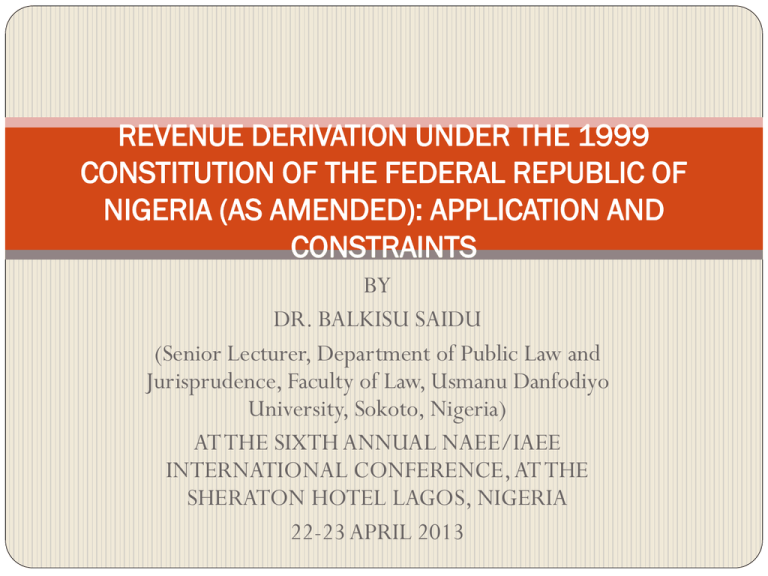
REVENUE DERIVATION UNDER THE 1999 CONSTITUTION OF THE FEDERAL REPUBLIC OF NIGERIA (AS AMENDED): APPLICATION AND CONSTRAINTS BY DR. BALKISU SAIDU (Senior Lecturer, Department of Public Law and Jurisprudence, Faculty of Law, Usmanu Danfodiyo University, Sokoto, Nigeria) AT THE SIXTH ANNUAL NAEE/IAEE INTERNATIONAL CONFERENCE, AT THE SHERATON HOTEL LAGOS, NIGERIA 22-23 APRIL 2013 INTRODUCTION Nigeria is blessed with numerous abundant natural energy resources petroleum (oil), gas, coal, solar, wind, sea-tides, etc Country’s income capacity has expanded exponentially over the years especially from revenues accruing from the exploitation and sale of petroleum products exports of oil and gas, in the last three decades, account for more than 98% of Nigeria’s export earnings and 83% of Federal Government Revenue exploitation of the resource is largely carried out in the Niger-Delta region Absence of concomitant economic development in the region environmental degradation and damage to the fishery industry widespread peaceful and violent agitations 2 Dr. Balkisu Saidu BRIEF HISTORY OF THE DEVELOPMENT OF NIGERIA’S OIL INDUSTRY Advent of the oil industry in Nigeria can be traced back to 1908 Nigerian Bitumen Corporation-Araromi area Disrupted by the outbreak of the First World War in 1914 Oil prospecting efforts resumed in 1937 Shell D'Arcy (the forerunner of Shell Petroleum Development Company of Nigeria) Interrupted by the Second World War, but resumed in 1947 First commercial discovery on-shore in January 1956 at Oloibiri in the Niger Delta region Actual oil production and export from the Oloibiri field in present day Bayelsa State commenced in 1958 3 Dr. Balkisu Saidu HISTORY OF THE DEVELOPMENT OF NIGERIA’S OIL INDUSTRY-CONTD Oil production rose from 5,100 barrels of crude oil per day in 1958 to 2.0 million barrels per day in 1972 and a peaking at 2.4 million barrels per day in 1979 Nigeria ranked 7th major oil producer in the world in 1972 Nigeria joined the Organisation of Petroleum Exporting Countries (OPEC) in 1971 established the Nigerian National Petroleum Company (NNPC) in 1977 Petroleum production and export account for about 90% of Nigeria’s gross earnings 34 billion barrels of recoverable crude oil reserves 159 trillion cubic feet (Tcf) of proven natural gas reserves In 2012, Nigeria was Africa’s largest producer of oil and the sixth largest oil producing country in the world 4 Dr. Balkisu Saidu OWNERSHIP OF PETROLEUM RESOURCES IN NIGERIA Passage of the Petroleum Act in 1969 seen as a major milestone in the history of the industry vests the ownership of all on-shore and off-shore petroleum resources and revenue derivable there-from in the Federal Government Section 1(1) “The entire ownership and control of all petroleum in, under or upon any lands to which this section applies shall be vested in the State.” All petroleum in, under or upon land, including land covered by water, which is in Nigeria; or is under the territorial waters of Nigeria; or forms part of the continental shelfs; or forms part of the Exclusive Economic Zone of Nigeria belongs to the Government of Nigeria 5 Dr. Balkisu Saidu OWNERSHIP OF PETROLEUM RESOURCES IN NIGERIA-CONTD Revenues that accrue to the Federal government from petroleum products comprise of monies from payment of bonuses, fees and rents in respect of licences and leases, royalties on exploration of these products at prescribed rates, sale of the products in the international or domestic markets, Oil Terminal dues and Bank Commissions, AND Taxes Subjects of taxes Exploration or oil-producing companies, which are taxed under the Petroleum Profits Tax Act 1959 (as amended) Oil marketing companies, taxed under the Companies Income Tax Act 1961 Contracting and servicing companies to the oil-producing companies also taxed under the Companies Income Tax Act 1961 Section 2 of the 1999 Constitution (as amended) provides for the various units that collectively make up the federation of Nigeria 36 states, the Federal Capital Territory Abuja, and 768 local government areas - second column of part II of the first schedule of the 1999 Constitution 6 Dr. Balkisu Saidu APPLICATION OF REVENUES DERIVED FROM PETROLEUM RESOURCES Revenues that accrue from the exploration and sale of petroleum products are usually shared among the three tiers of government along with other revenues generated from other sources petroleum production and export account for about 90% of Nigeria’s gross earnings raises significant contention among the three tiers of government and between the Federal Government and oil producing states Sharing formula thereof determined by statutes In the past, such statutes did not usually disaggregate the revenues that accrue to the Government by the sources they accrue from Modalities for the implementation of the statutes had raised controversies along the line of the sources the revenues accrue, particularly petroleum 7 Dr. Balkisu Saidu APPLICATION OF REVENUES-CONTD Inclusion of provisions in the laws to cater for the special interests of producers of the resources Less controversial areas for the application of the revenues: 1. Petroleum Equalisation Fund Petroleum Equalisation Fund (Management Board, etc) Act 1975 2. Defunct Petroleum Trust Fund (PTF) Petroleum (Special) Trust Fund Act 1993 (as amended) Gfjhj 3. Petroleum Technology Development Fund (PTDF) Petroleum Technology Development Fund Act of 1973 Petroleum Training Institute established by the Petroleum Training Institute Act of 1972 8 Dr. Balkisu Saidu MANIFESTATION OF TENSION IN THE ALLOCATION OF RESOURCES Nigeria is culturally heterogeneous, politically pluralistic and economically unequal cultural diversity or cultural pluralism of the country had played significant but not the dominant role in the exacerbation of tension in the determination of the formula for the allocation of revenues derived from utilisation of energy resources dominant prodders of the existing tension had been the political pluralism and economic inequality in the nation Balewa - Cultural pluralism is “the degree to which the citizens of a nation are divided into mutually exclusive and culturally distinctive groups” “the greater the cultural pluralism in a nation the greater the likelihood of political instability in that nation.” 9 Dr. Balkisu Saidu MANIFESTATION OF TENSION-CONTD Nigeria is a nation of cultural diversity yet with relatively compatible and mutually inclusive values multifarious problems wide economic gap among the citizens clamour for special allocation created difficulties in terms of the formulation of ways to appease the aggrieved segments without, by so doing, enraging the other segments Niger-Delta region Amnesty programme for the militants yet to bring an end to violent activities Joint Task Force (JTF) ‘flush out’ 10 Dr. Balkisu Saidu LEGAL AND POLITICAL FORMULATIONS ON RESOURCE ALLOCATION Neglect by the Government and the multinational oil companies demand for special formulation in the distribution of income generated from petroleum exploitation Section 162 of the 1999 Constitution “(1) The Federation shall maintain a special account to be called ‘the Federation Account’ into which shall be paid all revenues collected by the Government of the Federation …….. Provided that the principle of derivation shall be constantly reflected in any approved formula as being not less than thirteen per cent of the revenue accruing to the Federation Account directly from any natural resources.” (Emphasis mine) 11 Dr. Balkisu Saidu LEGAL AND POLITICAL FORMULATIONS Before 1999, revenue allocation was governed by the Allocation of Revenue (Federation Account, etc) Act, Cap. 16 Laws of the Federation of Nigeria 1990 as amended by the Allocation of Revenue (Federation Account, etc) Decree No. 106 of 1992, which by section 1(a) to (e) provides inter alia: (a) The Federal Government …… 48.5% (b) The State Government …… 24% (c) Local Government …… 20% (d) Special Funds …… 7.5% (i) Federal Capital Territory …… 1% of the Federation Account 12 Dr. Balkisu Saidu LEGAL AND POLITICAL FORMULATIONS a. Development of the mineral producing areas…… 3% of the revenue accruing to the Federation Account derived from minerals b. General ecological problems…… 2% of the Federation Account c. Derivation…… 1% of the revenue accruing to the Federation Account derived from universals d. Stabilisation Account…… 0.5% of the Federation Account plus the revenue arising out of using mineral revenue, instead of the Federation Account, as the base for allocation to the fund for development of the mineral producing areas and derivation 13 Dr. Balkisu Saidu LEGAL AND POLITICAL FORMULATIONS In 2002, the Government issued an Order ‘Allocation of Revenue (Federation Account, etc) (Modification) Order 2002’, which altered the previous formula to bring it in line with the proviso to section 162 of the 1999 Constitution. The Order provides that: “The amount standing to the credit of the Federation Account, less the sum equivalent to 13 percent of the revenue accruing to the Federation Account directly from any natural resources as a first line charge for distribution to the beneficiaries of the derivation funds in accordance with the Constitution, shall be distributed among the Federal and State Governments and the Local Government councils in each State of the Federation on the following basis, that is to say – 14 Dr. Balkisu Saidu LEGAL AND POLITICAL FORMULATIONS (a) The Federal Government 56.00 percent; (b) The State Government 24.00 percent; (c) The Local Government Councils 20.00 percent” 56% allocated to the Federal Government shall be utilised in the following manner: (a) Federal Government 38.50% (b) General Ecological Problems 2.00% (c) Federal Capital Territory 1.00% (d) Stabilisation Account 1.50% (e) Development of Natural Resources 3.00% 15 Dr. Balkisu Saidu LEGAL AND POLITICAL FORMULATIONS 24% standing to the credit of all the States in the Federation Account shall be distributed among the States of the Federation using the factors specified in the Act. 20% standing to the credit of Local Government Councils in the Federation Account shall be distributed among the States of the Federation for the benefit of their local government councils using the same factors specified in the Act Passage of the Order prompted ATTORNEY GENERAL OF ABIA STATE & 35 ORS VS. ATTORNEY GENERAL OF THE FEDERATION (2003) 1 SCNJ 131 16 Dr. Balkisu Saidu LEGAL AND POLITICAL FORMULATIONS Supreme Court “the exercise of the power to modify the allocation formula in the existing Allocation of Revenue (Federation Account, etc) Act, Cap. 16 Laws of the Federation of Nigeria 1990 as amended by the Allocation of Revenue (Federation Account, etc) (Amendment) Decree No. 106 of 1992 is constitutional and within the scope of the right of the President under the 1999 Constitution” Not inconsistent with the decision in ATTORNEY GENERAL OF ABIA STATE & 35ORSVS. ATTORNEY GENERAL OF THE FEDERATION (2002) 6 NWLR (PT. 762) 542, wherein the Court held that the charges on the Federation Account are inconsistent with the provision of section 162(3) of the 1999 Constitution and therefore invalid 17 Dr. Balkisu Saidu LEGAL AND POLITICAL FORMULATIONS Thorny controversy of whether, in the determination of the 13% accruable to oil producing States, there ought to be demarcation between onshore and offshore production For example ATTORNEY GENERAL OF THE FEDERATION VS. ATTORNEY GENERAL OF ABIA STATE (2002) 6 NWLR (PT. 764) 542 In determining whether the resources derived from the littoral States included oil drilled offshore, the Supreme Court held that “the southern boundaries of the littoral States of Nigeria is the sea, that is, the low water mark or the seaward limit of their territorial waters.” Passage of the Allocation of Revenue (Abolition of Dichotomy in the Application of the Principle of Derivation) Act 2004 ATTORNEY GENERAL OF RIVERS STATE VS. ATTORNEY GENERAL OF AKWA IBOM & 1 OR. (2011) 8 NWLR (PT. 1248) 31 18 Dr. Balkisu Saidu LEGAL AND POLITICAL FORMULATIONS Derivation formula is not limited to petroleum resources; it applies to all natural resources Non-oil producing communities have expressed reservations over the existing arrangement, especially with the abolition of the onshoreoffshore oil dichotomy They posit that the formula, as constituted, has reduced the distributable funds from the Federation Account to all tiers of government. Counter argument from oil producing littoral States is to the effect that the derivation formula ought to be raised from the current 13 percent to 50 percent; signifying that the debate on the derivation formula is far from over. Establishment of Niger Delta Development Commission Niger-Delta Development Commission (Establishment, etc) Act 2000 19 Dr. Balkisu Saidu CONCLUSION The existing legal and political formulations for the sharing of Nigeria‘s 20 revenue, oil and non-oil related, may not be the most acceptable to all the sections of the country It evoked mixed reactions from various interest groups and has continued to be a divisive issue in the polity It was arrived at after difficult, arduous and tumultuous years of deliberation, negotiation and experimentation To jettison such formulation and begin the same process all over again, especially in the volatile clime Nigeria finds itself, would be counterproductive Nigeria and Nigerians, collectively, stand to benefit from the continued existence of the country as one united nation There is the need for the scope of the issue to be refined from being a problem to being an opportunity for progressive design of ‘project Nigeria’ Dr. Balkisu Saidu




